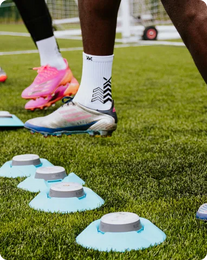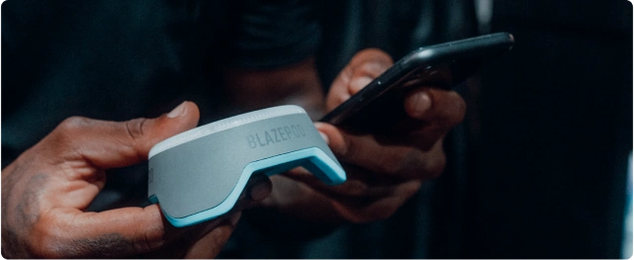The term “cognitive” seems to be associated with the sports and fitness industries more and more in recent years. Professional athletes are adding cognitive training to their regimens to become better, faster and more focused. But what does cognitive training actually mean? How does it help athletes become improved versions of themselves? And how valuable is it for just about everyone?

Cognitive, as defined by the Merriam-Webster Dictionary, is “relating to, being, or involving conscious intellectual activity.” Whether or not we are aware of it, humans rely on cognitive functions in everyday activities. This includes thinking, learning, memory and decision making - cognitive functions are a part of nearly everything we do. While they are vital parts of our daily lives, in sports, they are of utmost importance, and therefore it is critical for athletes to train not just their bodies, but their minds as well.
Get your BlazePod®
SHOP NOWAthletes are tasked with making decisions at the speed of light, under extreme pressure and with a lot on the line. Take Tom Brady as an example. The now seven-time NFL Champion, GOAT and possibly one of the greatest athletes to have graced any field, not just a football field, is under an immense amount of pressure every time the ball is snapped. Brady must be able to identify the locations of his wide receivers and tight ends as they hustle down the field, chased by the opponent’s secondary, which he must also keep an eye on to avoid an interception. Meanwhile, he must also be aware of everything going on just meters away from him, as linebackers are attempting to break through the offensive line and get to him before he’s able to get the ball out of his hands and downfield. All of this happens in a matter of just a few seconds.
Here’s another example, one from the soccer world. Imagine Kevin De Bruyne receiving a pass. At that exact moment, he must be aware of all of his surroundings, know who is open, who is running into space, which defenders can cut out a pass and whether there is a shot on goal, all while blocking out all the irrelevant noise and stimuli, such as the opponent’s fans.
When breaking down exactly what Brady and De Bruyne experience on the field, it is clearer why athletes must train their minds to make better decisions, faster, under the pressures of a game situation.
Professional athletes have adopted cognitive training into their daily routines, but in many cases, cognitive training is done by performing tasks that are separate from sport specific physical training, such as problem solving puzzles and reading.
However, the process of improving cognitive functions can be much faster and more efficient when training in a stimuli overloaded environment. This means combining physical and cognitive training rather than focusing on each separately. Athletes must train their minds in game-like situations, while going through those familiar physical motions, this way they can really understand how they can leverage improved cognitive skills in real-time, on the field.
Synchronizing physical and cognitive training isn’t just for the professionals, and should be a part of every training program, from grassroots to the gym, to help improve mental capabilities. It is even more important to implement cognitive training for the younger generations. Doing so will create more intellectual athletes, stronger both mentally and physically when they reach the big leagues, giving them a better chance to succeed in the long run.
Leveraging BlazePod's Flash Reflex (FRX) training is the perfect solution for synchronizing physical training with cognitive training. BlazePod's visual cues trigger the brain to process the cue, determine what it means in regards to the specific color or position, and formulate the correct response in the quickest time possible. While responding within physical sporting environments, results will be game changing.






















